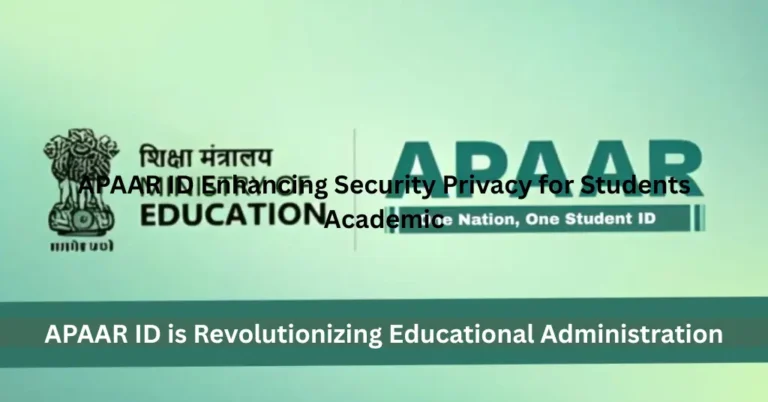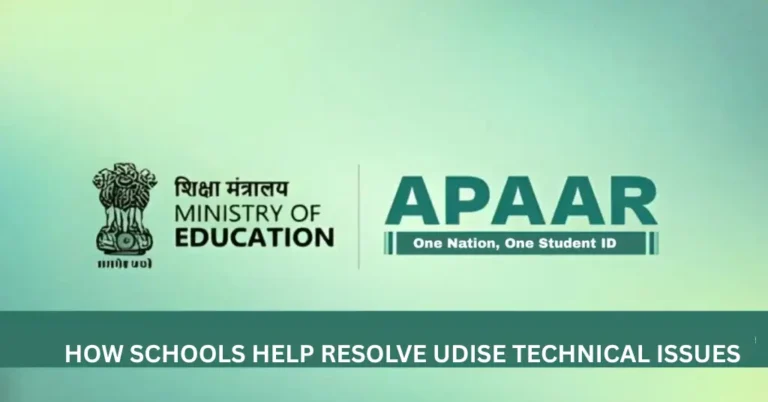Data Linked to APAAR ID Privacy and Security Concerns of the data linked to the Automated Permanent Academic Account Registry (APAAR) ID. With the growing push towards digitization in education, understanding how your personal information is handled is crucial. Let’s dive into the privacy and security concerns, and how you can protect your data.
APAAR ID and Why Is It Important
The APAAR ID Accessibility Challenges is a unique 12-digit identifier assigned to every student in India. It’s part of the government’s initiative to manage academic records more effectively. This system connects to other platforms like DigiLocker and the Academic Bank of Credits (ABC), making it easier for students to access and manage their educational credentials.
Your Data Protected in the APAAR System
Encryption: All data, including academic records and personal information, are encrypted. This ensures that even if someone gains unauthorized access, they cannot easily read the data.
Aadhaar-Based Authentication: Since the APAAR system is linked with Aadhaar (India’s biometric identification system), access to records requires authentication through this system, adding an extra layer of protection.
Centralized Security Protocols: The Ministry of Electronics and Information Technology (MeitY) ensures that security protocols are followed to the letter, offering some assurance regarding the safety of the data.

Privacy Concerns with APAAR ID
Excessive Data Collection: The system collects a lot of personal data, including Aadhaar numbers, academic records, and possibly contact information. If this data isn’t managed well, it could pose risks to privacy.
Informed Consent: There are concerns over whether parents and students fully understand what data is being shared, especially in rural areas where digital literacy is low. Are they truly giving informed consent?
Long-Term Data Storage: The data stored in the APAAR system is retained indefinitely. If you ever wanted to delete your data, the process might not be as straightforward as it should be.
What You Can Do to Protect Your Data
Stay Updated: Regularly check for any updates or changes to the APAAR system. Ensure you are aware of how your data is being used.
Exercise Your Data Rights: The Digital Personal Data Protection Act (2023) gives you the right to access, correct, or delete your data. Don’t hesitate to exercise these rights if you have any concerns.
Request Information: If you’re unsure how your data is being stored or used, reach out to the authorities or relevant institutions for clarification.
What Are the Risks of Data Breaches?
Data breaches could expose sensitive personal information like your child’s academic records, Aadhaar details, and other private data. Given the centralized nature of the APAAR system, it could become a target for cyber-attacks. However, the Indian government has claimed that stringent security protocols are in place to prevent such incidents.
Legal Safeguards in Place
India has laws like the Digital Personal Data Protection Act, 2023, that regulate how data is collected and used. The Act ensures that organizations handling personal data, including educational institutions, must maintain transparency, consent, and security measures.
Is my personal information safe in the APAAR ID system?
Yes, the data is encrypted and linked to Aadhaar-based authentication. However, as with any online system, there are always risks.
Can I delete my data from the APAAR system?
While the Digital Personal Data Protection Act gives you the right to delete your data, it’s still unclear how easy the process is for APAAR records. Make sure to stay informed on the steps involved.
What happens if there’s a data breach in the APAAR system?
While the government claims robust security measures are in place, data breaches could expose sensitive personal information. Stay updated and take necessary precautions.
Do I need to give consent for my child’s data to be linked with APAAR ID?
Yes, consent is required to create an APAAR ID for your child. However, the system is voluntary, and you can opt out if you prefer.
How can I ensure my data is secure in the APAAR system?
To protect your data, stay informed about the latest updates, request clarity on how your data is used, and exercise your rights to access or delete your information.
Final Words
The APAAR ID system brings both benefits and challenges. While it simplifies recordkeeping and enhances access to academic data, it’s important to consider the privacy and security risks involved. By staying informed, exercising your rights, and taking steps to protect your data, you can make sure your personal information is in safe hands.




